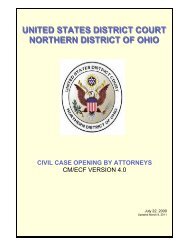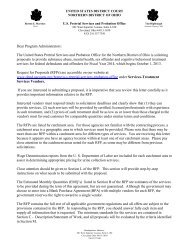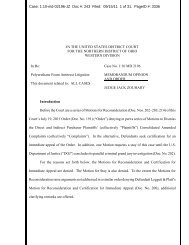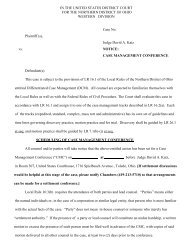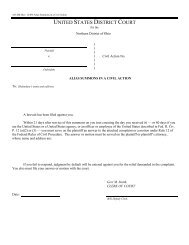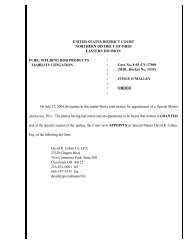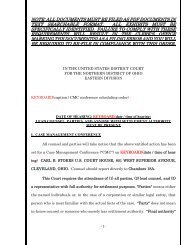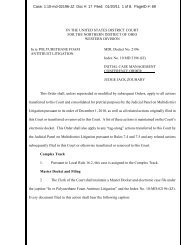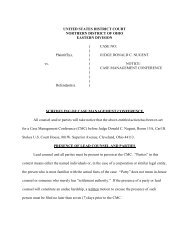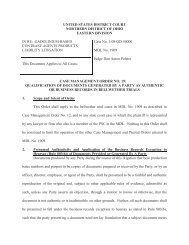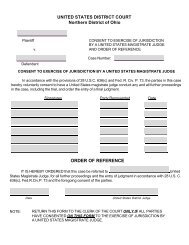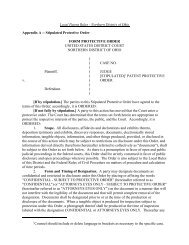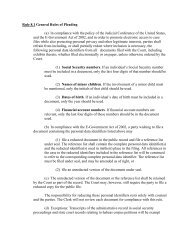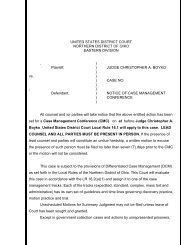1001 - Northern District of Ohio
1001 - Northern District of Ohio
1001 - Northern District of Ohio
Create successful ePaper yourself
Turn your PDF publications into a flip-book with our unique Google optimized e-Paper software.
Case 1:03-cv-17000-KMO Document <strong>1001</strong> Filed 04/05/05 Page 8 <strong>of</strong> 10<br />
28 U.S.C. §1367(c)(3)). 6 Thus, in any individual case where there is no factual basis for the defendants<br />
to assert a colorable federal defense against a specific plaintiff that serves to fulfill the jurisdictional<br />
requirements, the Court does not have and will not exercise jurisdiction. At this juncture, neither the Court<br />
nor the parties knows whether there is such a factual basis in each case. Accordingly, as discussed in<br />
section II.B below, the denial <strong>of</strong> the plaintiffs’ motion to remand in each severed case is without prejudice.<br />
Further, the Court must reject defendants’ suggestion that it enter any subsequent remands “with<br />
the caveat that . . . [the remanded cases] cannot be rejoined in state court.” Brief in opp. at 17. If the<br />
Court concludes it does not have jurisdiction over a given case, then its power over the parties is at an end.<br />
Similarly, this Court has no authority over any other court which does have jurisdiction over the case.<br />
Whether any plaintiffs whom this Court remands to West Virginia state court may later re-join in state court<br />
is a matter for that court, not this one.<br />
B. Without Prejudice.<br />
As a general matter, “a motion to remand may be made at any time before final judgement.”<br />
DaCosta v. Novartis AG, 180 F.Supp.2d 1178, 1183 (D. Or. Aug. 31, 2001); see Duncan v. Stuetzle,<br />
76 F.3d 1480, 1491 (9 th Cir. 1996) (plaintiff’s motion to remand action to state court was timely, even<br />
6<br />
Indeed, the Court’s “inclination” appears to be a requirement in these circumstances. See Ortolf<br />
v. Silver Bar Mines, Inc., 111 F.3d 85, 86-87 (9 th Cir. 1997) (“Supplemental jurisdiction must be<br />
exercised in the same action that furnishes the basis for exercise <strong>of</strong> supplemental jurisdiction. The power<br />
<strong>of</strong> federal courts to exercise supplemental jurisdiction extends to ‘all other claims that are so related to<br />
claims in the action’ when a district court has original jurisdiction ‘in any civil action.’ 28 U.S.C. §1367(a).<br />
The phrases ‘in any civil action’ and ‘in the action’ require that supplemental jurisdiction be exercised in<br />
the same case, not a separate or subsequent case.”) (emphasis added).<br />
8



